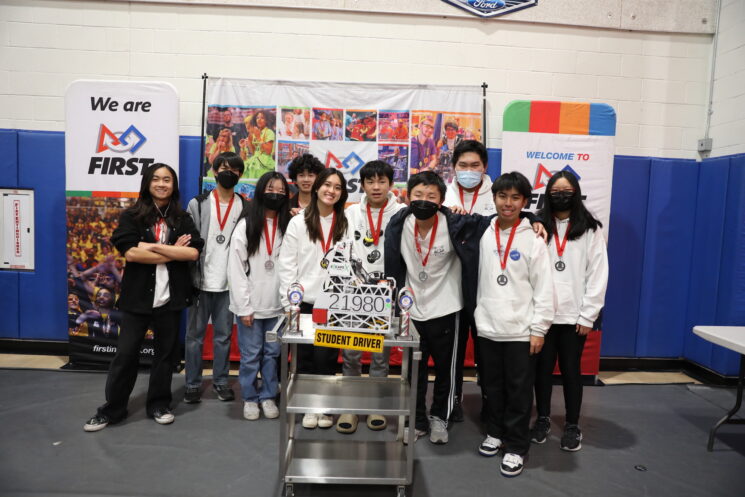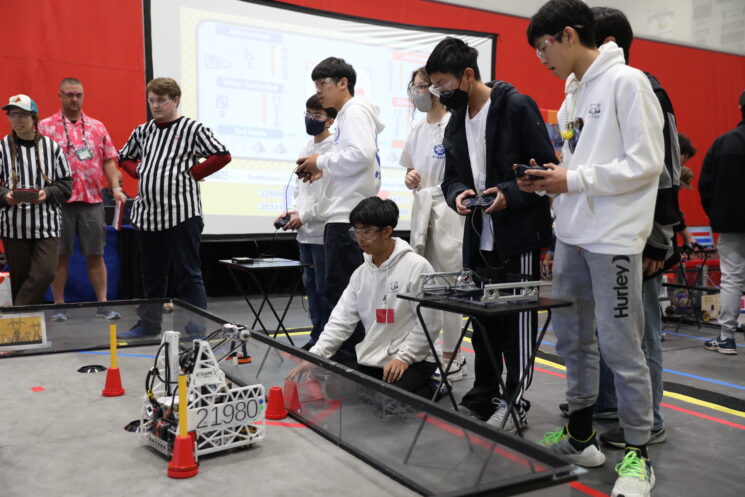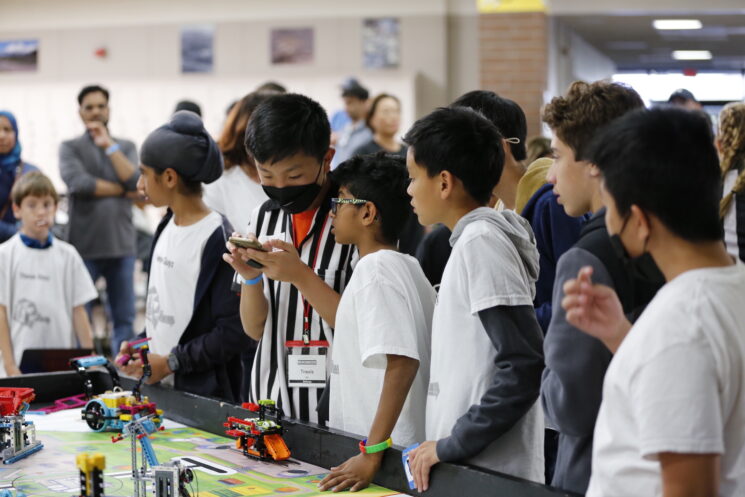
By Uy Pham
For thirteen seventh-grade students at Fulton Middle School, participation in the school’s robotics programs ignited their interest in the world of robotics while simultaneously molding their friendship amongst each other.
Deciding to form what is known today as Bread Pandas, these thirteen friends-turned-teammates started off from ground zero. Hosting daily meetings out of a garage, the entire team was developed from scratch.
Now, Bread Pandas is one of the top Southern California teams in the FIRST Tech Challenge (FTC).
“FIRST is an international organization that inspires students to become leaders and innovators through friendly competition. It is broken into multiple different competitions and we compete in the competition level called FIRST Tech Challenge, or FTC,” Bread Pandas captain and sophomore Ian Tsai said. “In FIRST Tech Challenge, we compete against other robotics teams in order to complete challenges and earn points.”
Bread Pandas is a largely student-led team. As a result, to develop the team, these students had to overcome some obstacles: creating a team structure, organizing tasks and setting goals.
Eventually, the team established various roles to fulfill the team’s needs: competition roles, which manage and analyze the robot during the competition, and general roles, which involve tasks such as finance, programming and designing.
This year’s challenge, Power Play, challenges teams to navigate through a playing field consisting of junctions and poles. Alliances, which are composed of two teams, are tasked with placing cones onto certain junctions to obtain points.
To prepare for the competition, the team must understand the point-scoring system of the game, brainstorm ideas for the construction of the robot and work through the process of constructing the robot.
“We spend time using computer-aided design to turn our ideas into a 3D model. Using various forms of machining and our computer-aided design as a blueprint, we bring our design into reality,” sophomore Andrew Hinh, Bread Pandas build and design lead, said. “We then spend many hours programming our robot and further optimizing our designs in order to prepare for competition.”

Initially, one of the struggles included finding funding to construct the robot and finance various other activities. Through the development of financial planning skills, Bread Pandas established connections with local community members and businesses and applied for various grants to finance the team.
The entire process results in Bread Pandas members spending approximately 3-4 hours each day for several months to prepare for competitions. Even after the designing process, the preparation process also takes careful consideration.
“There are many different things that we need to do in order to prepare for the competitions, [which] requires many all-nighters,” Bread Pandas vice-captain and sophomore Travis Wu said. “These preparations include packing up everything, doing many software checks and also making sure that the drivers had enough practice with the robot. “
At the competition, the team must complete both a judge’s interview and inspection, which involves presenting the robot and answering questions the judge may have. Afterward, qualification matches determine the order in which alliances are selected. Elimination matches follow to determine the winners, which are recognized at awards ceremonies.
After four league meets, teams have the opportunity to attend a qualifying tournament for an opportunity to progress through a system of regional, state, and eventually, a world championship.
This year, despite the initial struggles, Bread Pandas advanced to the elimination rounds of the state championships along with high rankings in various categories.
“One achievement I’ve been most proud of [was] ranking [second] overall in qualification matches for states,” Wu said. “We were able to, at one point, hold the [Southern California] high score and the second highest Operational Power Rating in [Southern California]. It was an amazing experience to have basically all the best teams request us to choose them as an alliance partner for [the] states’ championship.”
Within robotics, Bread Pandas has constantly expanded their knowledge from new mechanical concepts to brainstorming innovative designs through revisions and iterations of the robot. The knowledge gained has been shared as Bread Pandas also focuses on reaching to the community.
“We have been mentoring aspiring FIRST Tech Challenge teams such as the students from Fulton Middle School. We have also created many workshops to teach others about robotics, as well as its many real-world benefits,” Tsai said. “In order to help our community, we have also volunteered at multiple FIRST events [and] teamed up with a team called Code Orange to help pack food for those in need and give out free 3D printers to students.”

Bread Pandas continues to strive towards promoting robotics and demonstrating the accessibility and real-world value of robotics in both careers and daily life. While maintaining their goal of competitive success, Bread Pandas’ key focus remains centered on community connections and building skills in communication and leadership.
The ultimate competitive stage of FTC is the World Championships in Houston, Texas, where teams from around the world compete against each other.
“I made a promise to our seventh-grade robotics teacher Mrs. Lee that I would make it to Worlds one day,” Wu said. “So one of my goals would be making it to the World Championships.”
This article was originally published in the 2023 RED Magazine. Stop by room 306 to pick up a copy.





